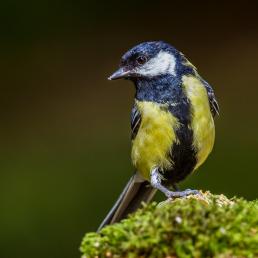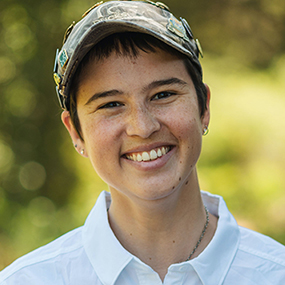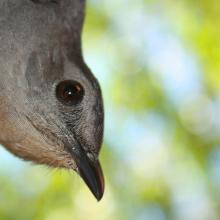

Join BirdNote tomorrow, November 30th!
Illustrator David Sibley and actor H. Jon Benjamin will face off in the bird illustration battle of the century during BirdNote's Year-end Celebration and Auction!
Many bird species can eat the fruits of plants that are toxic to humans —even the white berries found on poison ivy. These birds just aren’t sensitive to the compounds in the berries that are irritating or poisonous to people. While you probably want to stay away from poison ivy, you can improve habitats for birds by planting native fruit bushes and advocating for wildlife-friendly gardening in public green spaces.
BirdNote®
Birds Can Eat Toxic Berries
Written by Conor Gearin
This is BirdNote.
[Leaf rustling]
Poison ivy is the bane of many outdoor enthusiasts. The plant’s distinctive leaves are made up of three leaflets. And starting in late summer, its branches are full of whitish berries that are toxic to humans. But not to a Gray Catbird. They’ll land on poison ivy and pluck off the berries, one after another.
[Gray Catbird calls, ML 250375621]
Just like its leaves, poison ivy berries are rich in an oil called urushiol that can cause a serious allergic reaction in humans. But catbirds and other bird species just aren’t sensitive to urushiol. Poison ivy berries are one of many fruits that help birds survive fall and winter once insects become scarce.
Other wild fruits such as pokeberry, holly, and Virginia creeper are poisonous to humans but not to birds. So the old survival advice to eat the berries that birds eat turns out to be pretty misleading.
[Red-eyed Vireo song, ML 247983971]
While you probably want to stay away from poison ivy, you can improve habitats for birds by planting native fruit bushes and advocating for wildlife-friendly gardening in public green spaces.
[Red-eyed Vireo song, ML 247983971]
Learn more on our website, BirdNote dot ORG. I’m Ariana Remmel.
###
Senior Producer: John Kessler
Content Director: Allison Wilson
Producer: Mark Bramhill
Managing Producer: Conor Gearin
Bird sounds provided by The Macaulay Library of Natural Sounds at the Cornell Lab of Ornithology, Ithaca, New York. Gray Catbird ML 250375621 and Red-eyed Vireo ML 247983971 recorded by M.D. Medler.
BirdNote’s theme was composed and played by Nancy Rumbel and John Kessler.
© 2022 BirdNote September 2022 Narrator: Ariana Remmel
ID# fruit-02-2022-09-07 fruit-02




